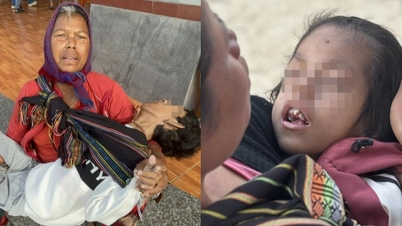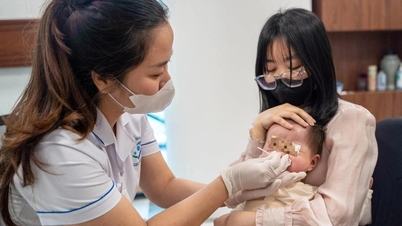Note for people entering from epidemic countries in Africa within 21 days
Deputy Minister of Health Nguyen Thi Lien Huong has just signed a document to the People's Committees of provinces and cities across the country and the Institutes of Hygiene and Epidemiology, Pasteur Institute on strengthening surveillance and prevention of Marburg disease.
The Ministry of Health requests the People's Committees of provinces and cities across the country, the Institutes of Hygiene and Epidemiology, and Pasteur to proactively strengthen surveillance and prevention of Marburg disease to prevent the disease from spreading into Vietnam. Request the People's Committees of provinces and cities to direct the Department of Health to strengthen close surveillance of entrants, in the community and at medical facilities to promptly detect suspected cases of the disease for epidemiological investigation, and pay attention to people entering from countries with epidemics in the African region within 21 days. At the same time, coordinate with the Institutes of Hygiene and Epidemiology, Pasteur to collect samples for diagnostic testing, manage cases (if any) and handle them to prevent the disease from spreading to the community...
Transmission of Marburg virus
Most recently, on February 7, 2023, the Ministry of Health and Social Welfare of Equatorial Guinea reported at least eight deaths that occurred between January 7 and February 7, 2023, in two villages in the Nsock Nsomo district of Kie-Ntem province. According to epidemiological investigations, the cases presented with fever, followed by weakness, vomiting, and bloody diarrhea; two cases also presented with skin lesions and bleeding from the ears.
On February 14, the World Health Organization (WHO) held an emergency meeting after at least nine people in Equatorial Guinea died from Marburg virus hemorrhagic fever (MVD). The host of the Marburg virus is the African fruit bat, Rousettus aegyptiacus. Marburg virus disease is a rare but serious hemorrhagic disease that affects both humans and primates, with a case fatality rate of up to 88%.
Marburg is transmitted from person to person through direct contact (through broken skin or mucous membranes) with the blood, secretions, organs, or other body fluids of infected people, and with surfaces and materials (e.g., bedding, clothing) contaminated with these fluids. Health-care workers have previously been infected while treating patients with suspected or confirmed MVD. Burial ceremonies involving direct contact with the body of the deceased may also contribute to the transmission of Marburg.
The incubation period varies from two to 21 days. Marburg virus disease begins abruptly with high fever, severe headache, and severe malaise. Severe diarrhea, abdominal pain and cramps, nausea, and vomiting may begin on the third day. Severe hemorrhagic manifestations appear five to seven days after the onset of symptoms, and fatal cases usually have some form of bleeding, often from multiple sites. In fatal cases, death most often occurs eight to nine days after the onset of symptoms, often preceded by severe blood loss and shock.
In the early stages of the disease, the clinical diagnosis of MVD is difficult to differentiate from many other tropical fevers due to similar clinical symptoms. Other viral hemorrhagic fevers must be excluded, including Ebola virus disease, as well as malaria, typhoid fever, leptospirosis, rickettsial infections, and plague. Laboratory confirmation can be achieved by various tests, such as antibody-capture enzyme-linked immunosorbent assay (ELISA), antigen capture detection assay, serum neutralization test, reverse transcription polymerase chain reaction (RT-PCR), electron microscopy, and virus isolation by cell culture.
Although there are no approved vaccines or antiviral treatments to treat the virus, supportive care—rehydration with oral or intravenous fluids—and treatment of specific symptoms improves survival. A range of potential treatments are being evaluated, including blood products, immunotherapy, and drug therapy.
WHO risk assessment of Marburg virus disease
WHO states that control of Marburg virus disease outbreaks relies on the use of a range of interventions, namely case management, surveillance including contact tracing, good laboratory services, infection prevention and control including safe and dignified burials, and social mobilization. Community engagement is key to successful control of MVD outbreaks. Raising awareness of the risk factors for Marburg infection and the protective measures that individuals can take is an effective way to reduce human transmission.
Communities affected by Marburg should make efforts to ensure that the population is well informed, both about the nature of the disease and about the necessary outbreak containment measures.
Outbreak containment measures include prompt, safe and dignified burial of the deceased, identification of people who may have been in contact with people infected with Marburg and monitoring their health for 21 days, isolation and care of confirmed patients, and maintenance of good hygiene and environmental cleanliness.
Health care workers caring for patients with or suspected of having MVD should use additional infection control measures in addition to standard precautions to avoid contact with the patient's blood and body fluids and with contaminated surfaces and objects.
WHO recommends that male survivors of MVD practice safer sex and hygiene for 12 months from the onset of symptoms or until their semen has tested negative for Marburg virus twice. Contact with body fluids should be avoided and washing with soap and water is recommended. WHO does not recommend isolation of recovering male or female patients who have tested negative for Marburg virus in their blood.
However, WHO has advised against travel and/or trade restrictions to Equatorial Guinea based on the currently available information on the current outbreak.
THANH HAI
Source


































































































Comment (0)